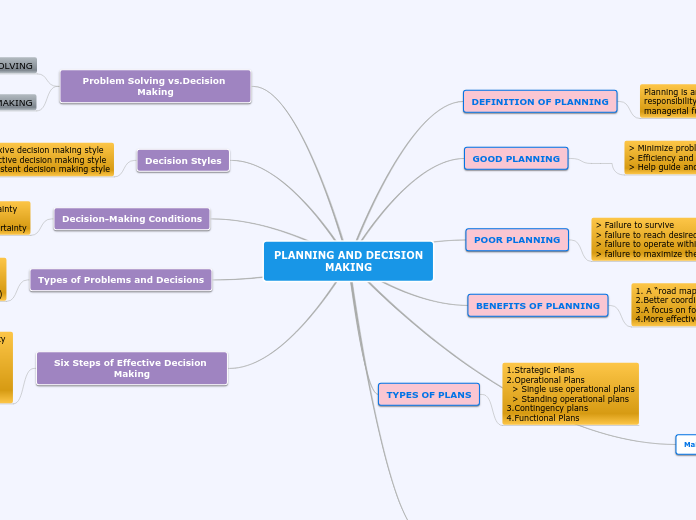PLANNING AND DECISION
MAKING
DEFINITION OF PLANNING
Planning is an essential management responsibility that proceeds other managerial functions.
PLANNING SHOULD BE
> Formally prepared
> Factual, logical and realistic
> Planning may cover a long-term or short-term period.
GOOD PLANNING
> Minimize problems
> Efficiency and effectiveness
> Help guide and control performance
POOR PLANNING
> Failure to survive
> failure to reach desired objectives
> failure to operate within budget
> failure to maximize the use of resources
BENEFITS OF PLANNING
1. A “road map,”
2.Better coordination,
3.A focus on forward thinking
4.More effective control systems.
TYPES OF PLANS
1.Strategic Plans
2.Operational Plans
> Single use operational plans
> Standing operational plans
3.Contingency plans
4.Functional Plans
Main topic
Main topic
Problem Solving vs.Decision Making
PROBLEM SOLVING
the process of taking corrective action to meet objectives.
DECISION MAKING
the process of selecting a course of action that will solve a problem/ making a choice from two or more alternatives.
Decision Styles
> The reflexive decision making style
> The reflective decision making style
> The consistent decision making style
Decision-Making Conditions
> Certainty
> Risk
> Uncertainty
Types of Problems and Decisions
> Structured problems
( programmed decisions )
> Unstructured problems
( unprogrammed decisions )
Six Steps of Effective Decision Making
Step 1: Define the Problem or Opportunity
Step 2: Set Objectives and Criteria
Step 3: Generate Alternatives
Step 4: Select the Most Feasible Alternative
Step 5: Implement the Decision
Step 6: Control the Results
